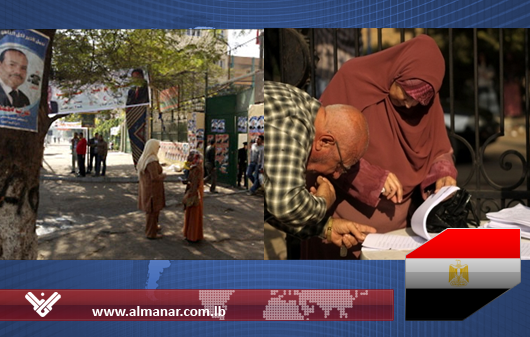The results are expected to strengthen the President Hosni Mubarak’s ruling National Democratic Party’s (NDP) grip on power and further weaken the opposition.
First results of Egypt’s elections are expected to be released on Monday with the turnout haven’t passed 25%, and demonstrators have continued protests during the night saying the vote was marred by fraud.
The results are expected to strengthen the President Hosni Mubarak's ruling National Democratic Party's (NDP) grip on power and further weaken the opposition.
Followers of the Muslim Brotherhood, the only serious organized opposition, gathered outside counting stations in Alexandria.
Several hundred others marched on a counting station in Cairo and other districts.
The party is predicted to win far fewer seats than the fifth of parliament it secured in the last elections in 2005, with more than 1,000 of its supporters have been arrested while campaigning or in clashes with police in past weeks.
Twelve of Muslim Brotherhood members were sentenced this week to two years in jail for handing out the group's leaflets and campaigning.
Egypt's High Election Commission had ordered 16 polling stations across five governorates across the country closed due to reports of violations and violence.
The channel’s correspondent in Cairo said that there were reports that several independent candidate representatives, affiliated with the Muslim Brotherhood, had been denied entry to polling stations.
The election campaign also saw clashes between the opposition and security forces who used teargas to disperse protesters.
Rights groups say Egyptian elections, which consistently reproduce NDP-dominated parliaments, are routinely spoiled by fraud at the ballot box, a claim denied by the government, which has pledged to hold a fair vote.
Local civil society groups have complained that the authorities rejected requests for thousands of permits to monitor the vote and the count, but the electoral commission says it granted more than 6,000 permits.
Only 10 per cent of observers who applied were granted permits to watch the voting and those who got them will be under tight restrictions, said a rights activist Bahey-eldin Hassan.
Local monitors are not allowed to question election officials or voters.
The government has barred international observers as an infringement of its sovereignty.
On the eve of the vote, the son of an independent candidate was stabbed to death as he was putting up posters of his father in Cairo, relatives and a medic said Sunday.
Two men attacked Omar Sayyed Sayyed, 24, on Saturday night in the Matariya district of the capital and stabbed him to death, family members said.
A security official said police had arrested both attackers who had confessed to killing Sayyed.
He said they had insisted they committed the murder because Sayyed was flirting with the sister of one of them.
But the relatives of the dead man denied this, saying the attack was politically motivated and that it occurred while Sayyed was putting up posters.
Sayyed's father, Sayyed Sayyed Mohammed, was an independent candidate in Sunday's parliamentary poll.
The results are expected to strengthen the President Hosni Mubarak's ruling National Democratic Party's (NDP) grip on power and further weaken the opposition.
Followers of the Muslim Brotherhood, the only serious organized opposition, gathered outside counting stations in Alexandria.
Several hundred others marched on a counting station in Cairo and other districts.
The party is predicted to win far fewer seats than the fifth of parliament it secured in the last elections in 2005, with more than 1,000 of its supporters have been arrested while campaigning or in clashes with police in past weeks.
Twelve of Muslim Brotherhood members were sentenced this week to two years in jail for handing out the group's leaflets and campaigning.
Egypt's High Election Commission had ordered 16 polling stations across five governorates across the country closed due to reports of violations and violence.
The channel’s correspondent in Cairo said that there were reports that several independent candidate representatives, affiliated with the Muslim Brotherhood, had been denied entry to polling stations.
The election campaign also saw clashes between the opposition and security forces who used teargas to disperse protesters.
Rights groups say Egyptian elections, which consistently reproduce NDP-dominated parliaments, are routinely spoiled by fraud at the ballot box, a claim denied by the government, which has pledged to hold a fair vote.
Local civil society groups have complained that the authorities rejected requests for thousands of permits to monitor the vote and the count, but the electoral commission says it granted more than 6,000 permits.
Only 10 per cent of observers who applied were granted permits to watch the voting and those who got them will be under tight restrictions, said a rights activist Bahey-eldin Hassan.
Local monitors are not allowed to question election officials or voters.
The government has barred international observers as an infringement of its sovereignty.
On the eve of the vote, the son of an independent candidate was stabbed to death as he was putting up posters of his father in Cairo, relatives and a medic said Sunday.
Two men attacked Omar Sayyed Sayyed, 24, on Saturday night in the Matariya district of the capital and stabbed him to death, family members said.
A security official said police had arrested both attackers who had confessed to killing Sayyed.
He said they had insisted they committed the murder because Sayyed was flirting with the sister of one of them.
But the relatives of the dead man denied this, saying the attack was politically motivated and that it occurred while Sayyed was putting up posters.
Sayyed's father, Sayyed Sayyed Mohammed, was an independent candidate in Sunday's parliamentary poll.
